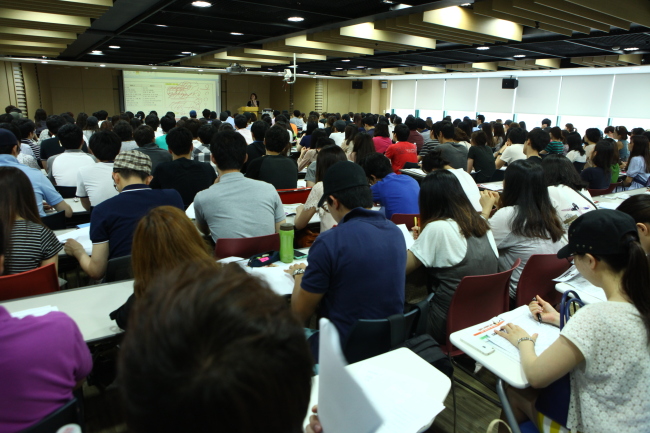Teenagers at Korean schools are the best in the world when it comes to solving problems. They also rank high on both math and reading proficiency tests, according to recent study of 44 nations by the Organization for Economic Co-operation and Development.
Yet, the nation lags behind many others when it comes to English language skills.
Korea is currently ranked 24th among 60 countries where English is not a native language ― behind Asian neighbors Malaysia (11th) and Singapore (12th) and only slightly higher than Japan (26th) ― according to a survey compiled by education firm Education First.
The results are ironic considering the time and money Koreans are known to spend on learning English. This is largely because the country’s traditional English instruction methods focus largely on memorization and grammar, and less on learning how to actually communicate in English, the EF said.
 |
|
People sit attend a private English class at Pagoda Academy in Seoul. (Pagoda Academy) |
That concern has been echoed by many educators who felt strongly that grammar-centered English curricula failed to help students develop the necessary skills to communicate beyond the classroom.
Gavin Farrell, professor of English linguistics at Hankuk University of Foreign Studies, said that grammar teaching is still given high priority at schools because of the current state-administered college exam, which only assesses reading and listening skills.
“Communicative competence is what all the experts advocate internationally, but in Korea it’s pointless because the entrance exam doesn’t measure students’ ability to communicate,” he added.
A high school English teacher based in Seoul said textbooks that are difficult to understand and learn from also discourage students from learning the foreign language.
He, in particular, noted that learning grammar structures through textbooks containing endless data on tenses, such as past perfect progressive or the future perfect passive, that are not exactly useful for communication is not the best use of class time.
“It is necessary to distinguish between advanced academic language proficiency and basic conversational and communication proficiency necessary to engage in daily interactions,” he added.
Striking a balance
Still, some educators insist that the importance of grammar cannot be neglected.
Knowing grammar, according to Oh Jun-il, professor of English literature at Pukyong National University in Busan, means “being able to understand how sentences are constructed.”
“Knowing about grammar helps understand what makes sentences and paragraphs clear and precise,” he said.
“Therefore it is imperative to understand grammar to be able to communicate and write in English,” added Oh, who is also the president of the Korea Association of Teachers of English.
A researcher from Hanyang University agreed that teaching English grammar is crucial, in particular, for students at a higher education level.
It would be an understatement to say that most Korean students are exposed to English learning for comparatively lengthy periods of time. But according to the researcher, students’ English reading and writing skills are not sufficient to attain advanced academic proficiency essential for producing academic prose.
“Conversational fluency does not carry with it the skills necessary for producing academic work, thus teachers and instructors should require students to attain a relatively advanced range of grammar and vocabulary,” she added.
The grammar-translation method that dominated foreign language education in Korea until the 1990s, has, in fact, changed, and now communicative language teaching is the dominant approach in English teaching at school, educators say.
But they point out that current secondary schools’ English curricular are overly focused on fostering students’ communication skills, while neglecting to educate them on the necessary grammar and sentence structures.
“Balance between grammar and communicative teaching is necessary to allow students to develop reading, listening and speaking skills, as well as writing,” Oh said.
The cons of cramming
The problem is not only the method, but also the purpose of studying English, critics say.
In particular, they say the context for English education in Korea will remain much the same as it has been as long as students’ primary interest in English is for test scores needed for academic degrees or job placement.
Farrell, who also works as a teacher trainer for the Certificate in Teaching English to Speakers of Other Languages, claimed that “extensive reading” is a good way to learn English grammar rules.
“Extensive reading means reading for pleasure, reading that is at or very slightly above the level of the student,” he said.
“That’s how I learned my English grammar and like most native speakers.”
He added, however, that learning through extensive reading cannot be done when textbooks are “too difficult” and exam questions ask “bizarre grammar questions.”
Oh also agreed that learning grammar for grammar’s sake would do more harm than good for students’ learning.
“It is necessary to practice grammar in order to be fluent in English, but that doesn’t mean you learn only from books. You need to practice grammar with more frequent speaking and writing practice,” he said.
By Oh Kyu-wook (
596story@heraldcorp.com)